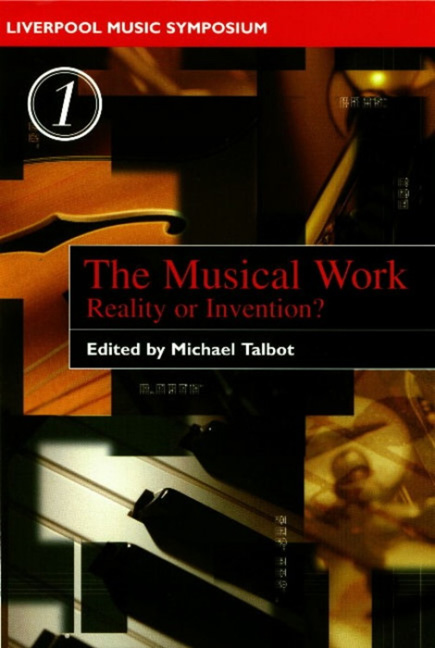Book contents
- Frontmatter
- Contents
- Notes on Contributors
- Introduction
- 1 Some Thoughts on the Work in Popular Music
- 2 Intertextuality and Hypertextuality in Recorded Popular Music
- 3 Work-in(g)-Practice: Configurations of the Popular Music Intertext
- 4 Work and Recordings: The Impact of Commercialisation and Digitalisation
- 5 The Practice of Early-Nineteenth-Century Pianism
- 6 Looking Back at Ourselves: The Problem with the Musical Work-Concept
- 7 ‘The Work’: An Evaluative Charge
- 8 The Work-Concept and Composer-Centredness
- 9 The Musical Artwork and its Materials in the Music and Aesthetics of Busoni
- 10 Re-composing Schubert
- 11 ‘On the Problems of Dating’ or ‘Looking Backward and Forward with Strohm’
- Index of Musical Compositions and Collections
- Index of Personal Names
6 - Looking Back at Ourselves: The Problem with the Musical Work-Concept
- Frontmatter
- Contents
- Notes on Contributors
- Introduction
- 1 Some Thoughts on the Work in Popular Music
- 2 Intertextuality and Hypertextuality in Recorded Popular Music
- 3 Work-in(g)-Practice: Configurations of the Popular Music Intertext
- 4 Work and Recordings: The Impact of Commercialisation and Digitalisation
- 5 The Practice of Early-Nineteenth-Century Pianism
- 6 Looking Back at Ourselves: The Problem with the Musical Work-Concept
- 7 ‘The Work’: An Evaluative Charge
- 8 The Work-Concept and Composer-Centredness
- 9 The Musical Artwork and its Materials in the Music and Aesthetics of Busoni
- 10 Re-composing Schubert
- 11 ‘On the Problems of Dating’ or ‘Looking Backward and Forward with Strohm’
- Index of Musical Compositions and Collections
- Index of Personal Names
Summary
The Impatience with the Work-Concept
In the title of this symposium, in some of its papers and in other recent writings on the musical work-concept, I sense an impatience with the work-concept that may do more harm than good to musical scholarship.
The work-concept has, of course, deeply influenced our musical culture; it is as ‘real’ as any aesthetic idea can be, and many generations of musicians have believed in it. When, however, the title of our symposium presents ‘reality’ and ‘invention’ as equal options for its definition, the verbal opposition implies that ‘invention’ means here ‘a fake’, ‘a fabrication’. As a historical statement, this would seem frivolous; I can only conclude that it is a rhetorical statement making a tongue-in-cheek reference to the demystificatory rhetoric which paints European cultural traditions of the nineteenth and early twentieth centuries as deeply devoted to fakes, ‘myths’ and ‘imaginary museums’.
In fact, when musical scholars spoke seriously of ‘The Myth of the Netherlands School’, the ‘Myth of Nationalism’ or ‘The Myth of the Musical Work’, they expressed a commitment to demystification and thus to truth and morality. Here, the term ‘myth’ is to be read not in the dignified sense of ‘a hallowed tale’ but in the common-parlance sense of ‘something fabricated’. What is the point of accusing a historical conceptual notion of being fabricated? Perhaps these are the offshoots of a Puritan rationalism that denies value or legitimacy to things that are not real, and perhaps there is an intention of warning young people off concepts, canons or distinctions that intellectuals have thought up to deceive them. A general mistrust of concepts characterises the tradition of philosophical realism so common in Western popular religion and Anglo-American political philosophy. This tradition outlaws concept as a carrier of truth and draws the consequences by elevating universal concepts that for normative reasons cannot be denied, such as God, Beauty, Nation, Work, to the rank of material existence. In the modern world, where scientific standards have changed more drastically than philosophical ones, the philosophical realist has turned positivist and falls into his own trap, now needing to argue that God, Beauty, Nation, Work, etc. are unreal and therefore untrue. When it is sometimes claimed that no musical works exist but only individual texts or performances, this same sort of disappointed realism may be involved.
- Type
- Chapter
- Information
- The Musical WorkReality or Invention?, pp. 128 - 152Publisher: Liverpool University PressPrint publication year: 2000

